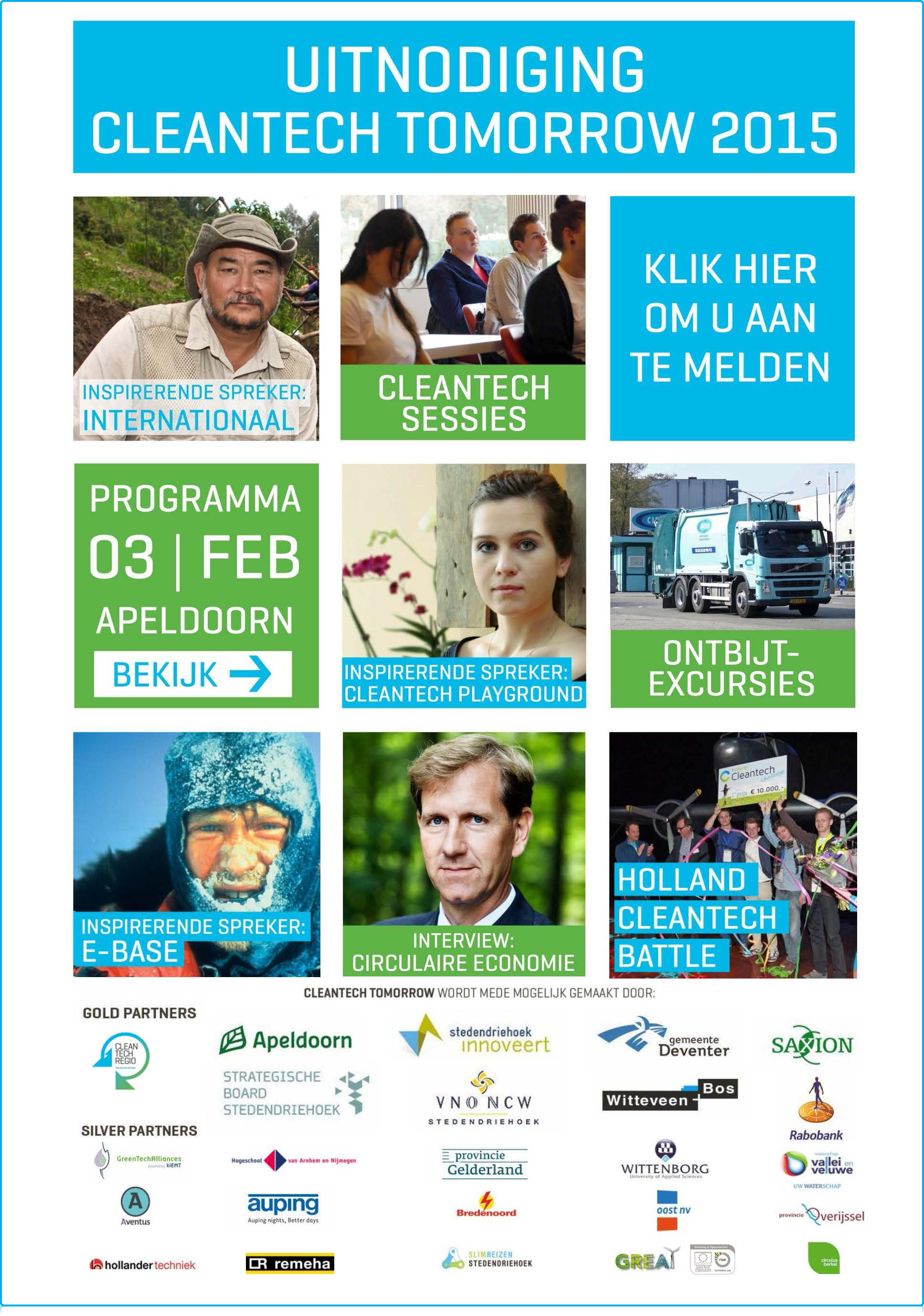Wittenborg Online News!
Cleantech Tomorrow Event: Wittenborg to Present Opportunities in International Energy Sector
Cleantech Tomorrow Event: Wittenborg to Present Opportunities in International Energy Sector
Cleantech Tomorrow Event: Wittenborg to Present Opportunities in International Energy Sector
Experts from Wittenborg University will present a workshop at the second annual Cleantech Tomorrow Event on 2 and 3 February in Apeldoorn. The event focuses on the use and production of clean technology by companies, the public sector and individuals. This year the emphasis will be on natural resources and food production.
The workshop is entitled: Sustainability and Innovation: A window for international market opportunities, by Wittenborg University and Oost NV. The event will be at the Theater Orpheus in Apeldoorn. Details about the full programme can be found here.
Wittenborg and Oost NV are partners in the cross-border, EU-funded GREAT-project which aims to encourage communities as well as small to medium size enterprises (SME’s) to develop technological solutions for Smart Grid, Renewable Energy and Distributive Generation. It also promotes research and develop policy issues for regulatory authorities and provide structured co-operation opportunities between SMEs, research institutes and technology developers.

In this project, Wittenborg is developing economic tools to inform and encourage SME’s to get further engaged in the use of green energy, stimulating investment in human capital, essential for the regional and national economy. Besides the Netherlands, the other partners in the GREAT-project are from Ireland, the UK and Belgium.
The workshop seeks to inspire innovative business opportunities in the clean energy field but also serve as a matchmaking session between companies and those who have experience in the international energy market or looking for access to the market.
The workshop will be opened by Jan Jonker from Oost NV who will introduce the GREAT project as a way of stimulating internationalization and renewable, sustainable energy area in North West Europe. He will also make an introduction about Smart Grid Alliances, Oost NV and its role in the GREAT project.
This will be followed by a talk from Wittenborg director, Maggie Feng, and senior lecturer, Saskia Harkema, who will introduce the university and the value of the tools it has developed for SME’s. Thereafter there will be an open discussion on the presentations.
On the progress made around the GREAT-project Harkema said In the Netherlands and Belgium a pilot is being run, to explore among a selected group of SME’s, what they are doing in this field.
“A selection has been made to focus on three sectors, namely: Manufacturing Industry, Agro-Food and Logistics. A small pilot will be run in which 20 companies will be approached to make a first assessment about their present application and usage of energy efficient technologies and solutions and obstacles to do so. To that end a digital questionnaire was developed," Harkema said.
“In The Netherlands we have spoken to several stakeholders from governmental organizations that play a coordinating role in trying to engage SME’s to use more energy efficient solutions and raise awareness to that effect. They showed a great interest in the GREAT project and re-affirmed the importance of the project. According to the people we spoke, SME’s are lagging behind when it comes to the adoption of energy efficiency in their business model or in their way of doing business. For SME’s, the use of renewable energy is primarily driven by (possible) financial gains – how much does it cost, and what is the financial benefit? - and only in second instance by the importance to think in terms of sustainability. “Within the region where Wittenborg University is located, in the east of The Netherlands, the municipality works with 8 so-called decentralized regional operational units which have a controlling and supervisory task and a role to engage with individual SME’S and groups of SME’s. The emphasis till now has been on control and supervision, but the aim is now to gear the efforts towards SME’s. The small-scale research we are carrying out should give us more insight in what are the barriers and obstacles which are holding back SME’s to go for energy efficient solutions. “
CleanTech stands for clean techniques that contribute to a sustainable world. This relates to products or services that contribute to a cleaner environment, the reuse of raw materials and/or energy savings and improving operational performances by increasing productivity and efficiency while reducing costs, energy consumption and waste.
WUP 29/1/2015
©Wittenborg University Press
by Anesca Smith
720 words
